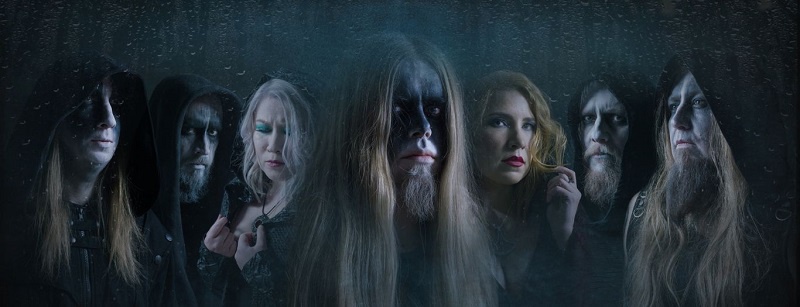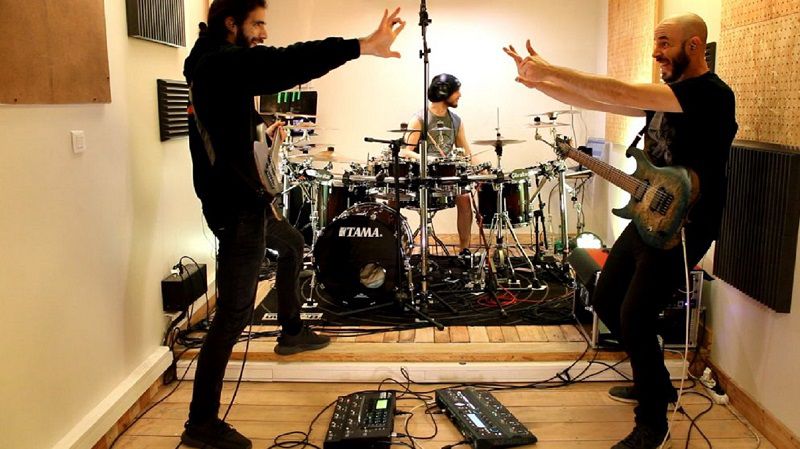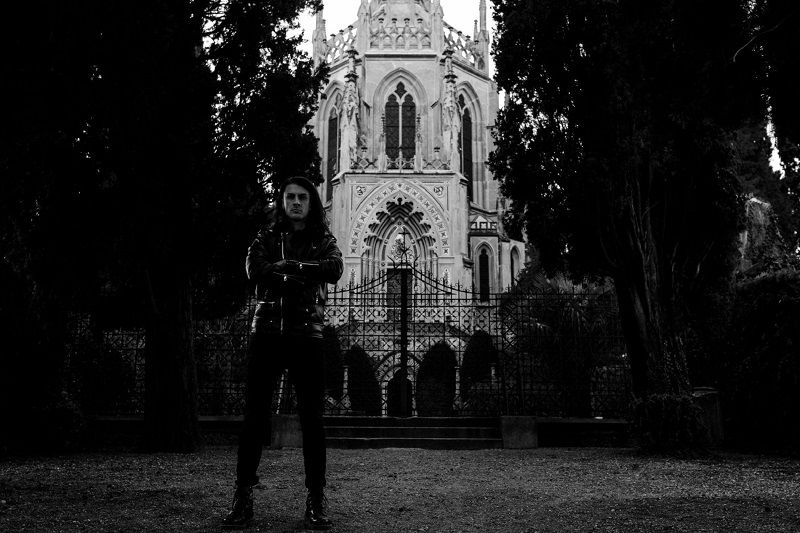League of Corruption Interview
9 min read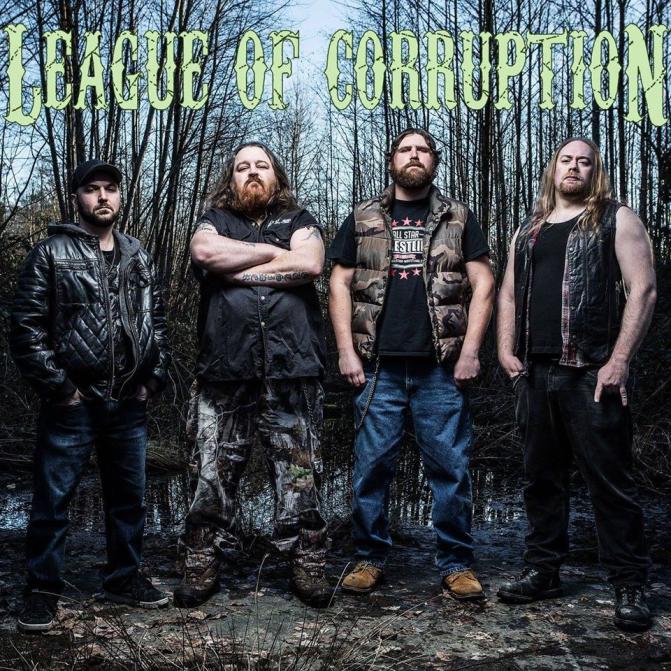
Them Corrupt Canadians
A southern groove and northern doom blend is in this League’s ‘Water’
By Justin Smulison
Emerging from the depths of Vancouver’s dive bars, garages and basement rock lounges, the League of Corruption will release their first official album, Something In The Water, on June 12 via Black Doomba Records. The League has been active in their local underground as an on-again, off-again unit, and this debut marks a solid lineup and is an unapologetic mesh of doom and groove.
Led by singer/guitarist Chris Barlow (ex-Mecha Messiah) and guitarist Brian Langley (current singer of Aggression), the quartet is not out to redefine the subgenres of doom and groove metal, but they are clearly trying to contribute to its longevity. From the guitar tone to Barlow’s booming voice, the influence of any project touched by Zakk Wylde or Pepper Keenan is undeniable through six tracks and 35 minutes. Check out the title track for a tune that just oozes beer-soaked attitude backed by thundering guitars.
Blessed Altar Zine contributor Justin Smulison spoke with Brian Langley, who is revered in Canada’s underground scene for his vocal work in Aggression — a band that has been active since the 1980s (though he joined in 2014) — and formerly with Infernäl Mäjesty.
They talked about the band’s inception, how lore and personal experience influenced their lyrics and how Southern U.S. metal impacts the members songwriting approach, down to their gear.
BAZ: How did the League of Corruption form?
Brian Langley: Back in 2005 Chris and I were playing in a different band together and he wanted to write more in the style of what League of Corruption plays. So I stuck with the other band and he started League of Corruption with a group of guys in 2005 and they put out a demo in 2010. The songs were good but the writing process was difficult as Chris was contributing to the majority of the writing. The chemistry just wasn’t there with the other guys in the lineup so Chris put the band to rest around 2011.
Chris and I were roommates through all of this and a few years later we started drinking beers with our neighbor across the street who just happened to be our bass player, Drewski. One night while shooting a few games of pool in the garage, I put on the LOC demo for Drew to hear and he fell in love with the songs. For the next few years, we would torture and torment Chris while we shot pool, drinking and singing along to that six-song demo on repeat. We’d tell Chris: “You gotta put the band back together but with us on guitar and bass!”
Drew’s other band was folding and he talked to his drummer, Paul, and just like that we had a drummer interested. We finally convinced Chris to do the band in the summer of 2016.
We were partying/camping at a metal festival called Metallion in Vanderhoof BC. I talked to the festival owner and asked him to put the League on the festival for the summer of 2017. He did, then I went and told Chris, “We’re playing this fest next year. Confirmed. Time to dust off the Les Paul.” We’ve been crushing beers and riffs ever since.
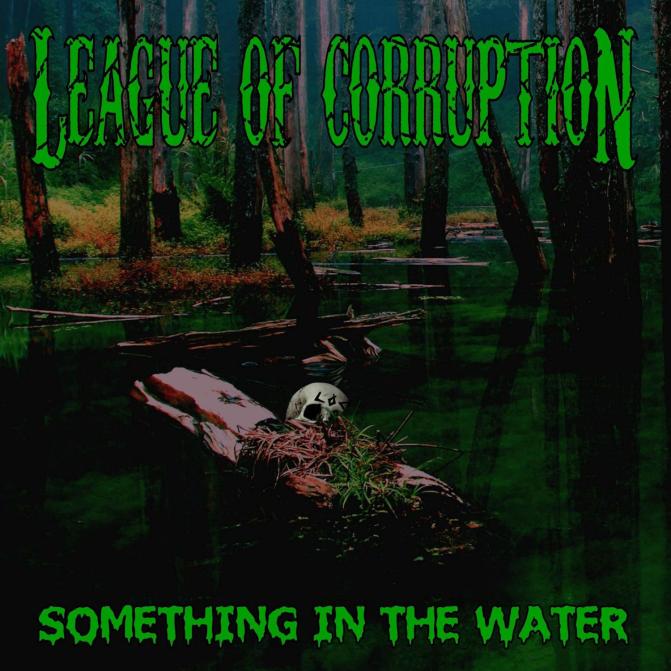
What changes — good and bad — have you witnessed or experienced as a unit in the local and underground scene?
I’ve noticed over the years that show attendance in general, not just our shows, are very hit-and-miss. Sometimes at local show, you’ll see bands just playing for the other bands and then other times a show that would normally only draw 30 to 50 people gets triple that. We’ve found playing outside of the big city has been more fruitful. Hit those smaller towns and folks tend to come out. A lot of venues have been shut down or no longer do live music. It’s tough to find a stage sometimes in town.
How does being from and recording in Vancouver have an impact on LOC’s sound?
Honestly, I don’t feel like it has much of an impact. Most of our sound influences come from England and the Southern United States (Black Sabbath, Down and Corrosion of Conformity). It sure makes us unique up here in Canada and Vancouver, though. There aren’t a lot of bands near us that are doing what we’re doing.
On that same idea, you are not from the Southern U.S., but how might your surroundings inspire a similar musical connection?
It’s tough to pinpoint. I’ve visited some of the southern states — mainly North Carolina — and I just felt right at home. It was like I blended right in. Growing up I’d go visit the family cabin in the BC interior on a lake. I’d go fishing all the time, there’s hunting in the area and we’d shoot guns out back. A few Summers ago Chris actually shot a tree down with his .30–06 It wasn’t the intent but we needed the firewood anyway. We’re pretty outdoorsy, we like to go out into the woods to get away from the trappings of civilization. We’re pretty laid back, I think that was what I liked best when I was in the South.
Some of the album’s charm comes from an ability to replicate an analog sound of early Southern metal and Zakk Wylde. Are you recording with analog equipment? How are you toning your instruments?
I’m so glad that you picked up on that! We’re not using analog equipment but as far as that tone and Zakk Wylde goes, we’re using the secret weapon: A Boss Super Chorus pedal. Chris plays a Les Paul through a Randall Century 200 Head (the same kind Dimebag used on Vulgar Display of Power) with a Marshall stack and I play a Dean Cadillac through a Peavey Triple XXX Head and a 5150 stack.
But we both have that Chorus pedal that Zakk swore by. Chris leaves his on through the entire live show. I only turn mine on for when I’m playing leads. I figure with his on during rhythms, I’d keep mine off to add a little bit of extra clarity to the riffs.
There seems to be a lot of “lore” in the music. How does that storytelling enter into the songwriting process? For example, does it start with a lyrical theme and then you jam on it?
Usually the way we approach our song writing is Chris or Drew will get really excited with a riff. After they play it, I’ll either alter it slightly or say “Okay, I got the next riff that complements that,” and Paul will jump in with a drum part. After all the music is nearing completion and the song structure is in place, then the lyric writing will start. I know Chris draws a lot of inspiration from his family’s English heritage or bar brawls that we were a part of years ago. He also gets ideas from the news and current events. I contributed lyrics to a song on the album, “Want Me Gone” and my inspiration was about something I had experienced. We always write about something that we can feel or connect with.
What is another song with a deeper meaning?
“Not Your Friend” is a good example. Chris’ dayjob for 20-plus years was as a pressman at a print shop. Automation has come in and he’s seen a lot of good people lose their jobs in favor of a machine. Technology is not your friend, the company doesn’t care about you. That’s a first-hand experience and it’s worth hollering about.
My favorite songs happen to be “Want Me Gone,” and “Where’s Your Savior Now?” They are the slower ones that sound like they were born from jamming on a bass groove. How were those songs composed?
“Want Me Gone” was absolutely born out of the drums and bass just jamming on a riff, and then we love those Down (Pepper/Kirk) harmonies so we through some of that in and then we established the main riff motif, I decided to drop it down a string very reminiscent of something Jimmy Page might have done on an earlier Zeppelin album and then it just wrote itself after that.
“Savior” is the first LOC song that was ever written before LoC was a band! The band we played in together before Chris put LOC together wrote that song. It was almost entirely Chris on this one. He brought the riffs to a band practice one day and said “Okay, here’s a song.” I added some accents and flair during the verses but everything else on that was Chris’ vision. The direct influence for that song and Chris has said it in the past, is Corrosion of Conformity’s song, “Albatross.” Without it, there would be no LOC.
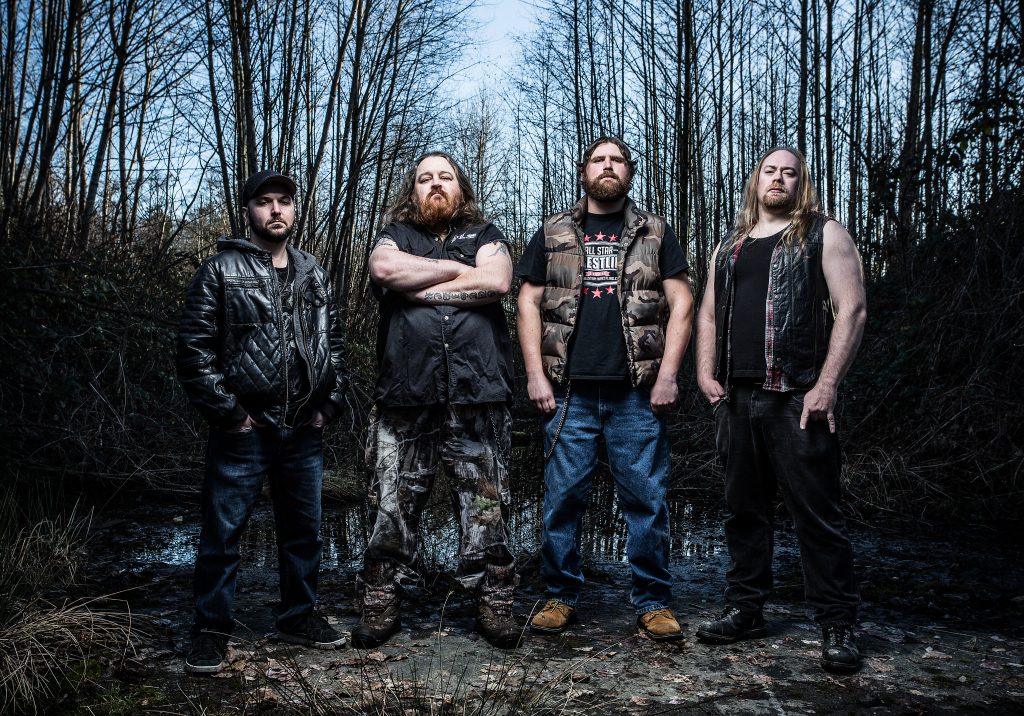
Let’s return to “Want Me Gone,” which has a standout lyric: “So now your free ride’s all over, you’re homeless and you are shamed/Self-inflicted you suffer, no I won’t take the blame.” Harsh stuff, but direct and honest. Was there any deliberation about writing that detail? Or was it a way to demonstrate consequences?
I was in a relationship that, looking back now, was pretty lopsided. I paid for everything, and when I’d try to stand up for myself and tell her that something wasn’t right….she’d gaslight me and make me feel like somehow I was the bad person in the scenario. I found out the hard way that she’d been running around on me for quite some time on top of that, so she had to go. And there was no way I was going to feel guilty about it.
The way I saw it, now you have to go without. No more handouts. Get one of your other boyfriends to shelter and feed you, you’re no longer my problem. I had no hesitations putting that lyric in there. It was honest and it was real.
What plans are there for a full-length follow-up?
We’ve got the album coming out officially on June 12th, we were going to play some shows and festivals this summer and fall but Covid pretty much put a stop to any tour plans for 2020. So we’re just continuing writing for the next album. [Laughing] I’m trying to sneak a song on the album that is under four minutes.
LOC has been together for a while and you have some heat with the album and the members’ collective resumes. What are the challenges or advantages when considering your peers (and competition) in the genre?
We don’t really look at it as competition. If we find ourselves on the same bill as a band that has a similar sound, we want to drink beer with them, we want to party with them and we want them to do well. It gets us all fired up, too. Like “somebody else gets it!”
The biggest challenge that we face is our geographical location. Ocean to the west, a 16-hour drive through the Rocky Mountains to the east, smaller communities and then frigid temperatures to the North and paying a bunch of money we don’t have to legally go down into the U.S. An advantage that we might have is also that we are a Canadian band. If you put on our album and I didn’t know what it was, you’d swear it came straight out of the NOLA Doom/Sludge scene. That to me is one of the greatest compliments you could give us. We love those bands and we have no problem telling people that.
How has the band been managing and spending time during COVID-19?
We’ve been getting together for some beers at a distance in my backyard, sending phone clips of riff ideas back and forth to work on. We’ve all been working on some other projects that we’ve got on the go, too.
How do you believe the band and your local scene will continue or reemerge once quarantining and social distancing is over?
People need to hear and see live music. If the venues shut down, there’ll be garage and basement shows. Me and the boys are chomping at the bit to get onstage and make the people move.
Label
Bandcamp
YouTube
Bigcartel
Site
**Please support the underground! It’s vital to the future of our genre.
#WeAreBlessedAltarZine
#TheZineSupportingTheUnderground

